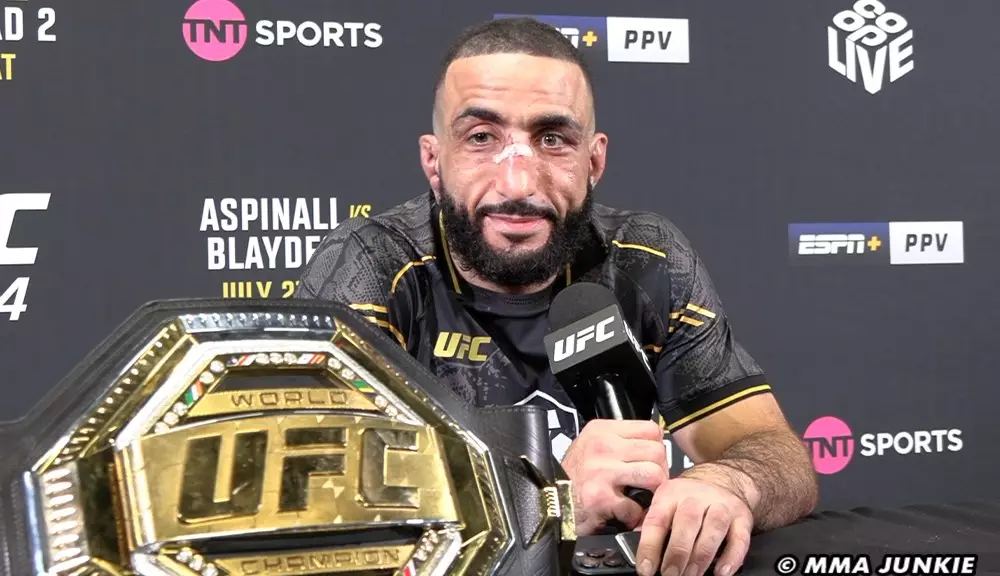UFC welterweight champion Belal Muhammad recently found himself at the center of a controversial discussion surrounding the possibility of an interim title fight while he is sidelined due to a toe infection. There is a nuanced dynamic at play here that delves deeper than simply match-ups. It raises significant questions about the integrity of championship titles and the UFC’s procedural framework regarding injuries and interim championships.
Muhammad’s injury has not only postponed his title defense but has also illuminated the often murky assessment of what a titleholder’s injury means for the division at large. While he was expected to face undefeated contender Shavkat Rakhmonov at UFC 310, his medical situation resulted in him needing immediate surgery, an event that turned his immediate future upside down. The champion himself expressed frustration about being out of action for a mere six weeks, emphasizing that the concept of an interim title seems premature in this context.
The timing of injuries in combat sports is particularly critical; six weeks off can be managed effectively, particularly when the fighter is buoyed by a prompt medical response. Muhammad emphasized that he believes he can return swiftly, which begs the question: Would it be right for Rakhmonov or any other fighter to compete for an interim title in what is essentially a brief lapse in championship activity?
Despite Muhammad’s concerns, Rakhmonov’s aspirations for an interim title fight stem from genuine competitive instincts. As a fighter, he is naturally inclined to remain active and seek opportunities. His rationale for pushing for an interim title suggests that he believes a championship belt, even if it’s temporary, would be a significant feather in his cap. Nonetheless, this presents a conflict between the need for action in the sport and maintaining the integrity of title recognition—an interim title should signify something rather than just serve as a placeholder.
The implications of creating an interim title may dilute the prestige of the championship itself by relegating it to a sporadic promotional strategy rather than a true determination of the best fighter in the division. Muhammad, while understanding Rakhmonov’s desire to stay in the fight scene, is adamant about recognizing the current champion, suggesting that the rightful holder of the title is still him—even if he cannot currently defend it.
The issue becomes increasingly complicated when considering the available contenders who could step in for Muhammad. Fighters such as Ian Machado Garry and Joaquin Buckley have also vocalized their interest but are themselves occupied with another match, creating a limited pool of potential competitors. Even more so, the notion that former champion Kamaru Usman and Rakhmonov train together poses an ethical dilemma—can they ethically fight each other for an interim championship when they know each other’s strategies inside and out?
Jack Della Maddalena’s uncertain health status further narrows the options for Rakhmonov. The UFC’s creative matchmaking has often involved delving into different weight classes to keep the schedule dynamic, an option that could be explored here. Some light heavyweight contenders hinted at potential fights that could fill the UFC 310 main event slot, but the efficacy of such a move remains questionable.
The entire situation highlights the complex interplay between fighter health, title integrity, and the promotional pressures faced by organizations like the UFC. While the immediate inclination might be to create exciting match-ups to retain viewer interest, it risks undermining the rigors and nuances of championship prestige.
As discussions unfold, the UFC remains at a crossroads where pragmatic solutions must align with ethical considerations. Whether or not an interim title fight will take place can only be determined through continued dialogue among athletes, the organization, and the fans who uphold the spirit of the sport. Muhammad and Rakhmonov’s saga will undoubtedly shape the future discourse around interim titles and champion representation—one that emphasizes both the thrill of competition and the significance of what it means to be a champion.

